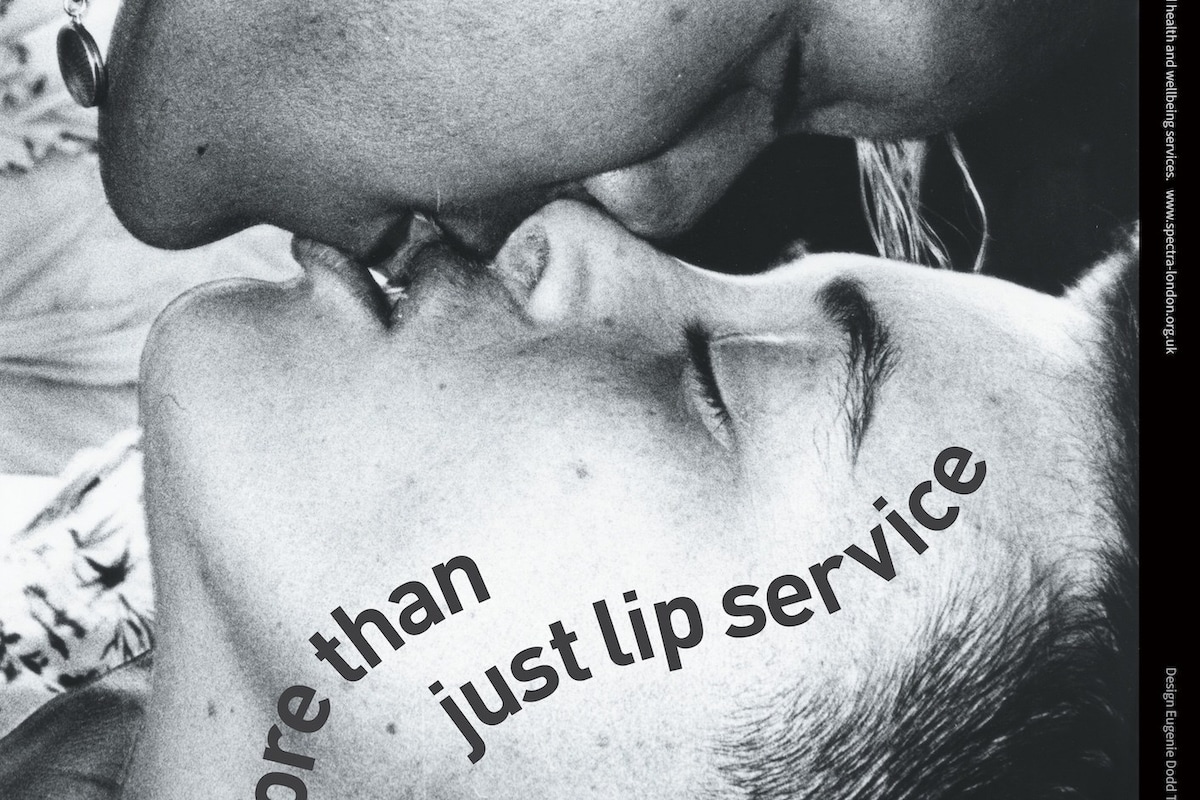Alongside new work by Jesse Glazzard and Pank Sethi, Studio Voltaire’s latest show surveys three decades of grassroots LGBTQ+ sexual health posters and photography
Grassroots and independent organisations have played a vital role in LGBTQ+ sexual health for decades. A new show at Studio Voltaire in south London presents a mass of archival posters, exploring how language, graphic design and photography can offer urgent information that governments have all too often failed to provide or wilfully obstructed. It’s a Love Thing also includes new works by photographers Jesse Glazzard and Pank Sethi. Together, the pieces draw a line from the HIV epidemic to today’s vicious attacks on trans right and healthcare.
“So many of these posters come from the 1980s and 90s,” says assistant curator Adwoa Owusu-Barnieh, who delved into Spectra CIC’s archive for the show. The work of contemporary photographers such as Sunil Gupta and Suzanne Roden proliferate the posters. “The messaging the government was handing out around HIV and Aids had an image of the grim reaper and a tombstone, which is seared into so many people’s minds. It promoted shame and spread homophobic sentiment. The sexual health organisations had much more positive messaging, brighter colours, photography of people and portraits. Their visual messaging highlights that real people were impacted by this.”
The posters directed people towards practical resources, providing safe spaces, testing facilities, and health literacy. Many groups were set up by friends or communities who placed posters around bars, nightclubs and other public spaces when they “didn’t have a government that was supporting them”. While some posters are slickly designed, with professionals collaborating with health organisations to form striking visual identities, others are recognisable for their organic approach and clip-art graphics. “You have posters that are incredibly kitsch and lo-fi,” says Owusu-Barnieh.
Catchy puns and tag lines abound, revealing a great deal of attention to the posters’ humanity, warmth, and ease of communication. For Terrence Higgins’ ‘Get Set for Safer Sex’ campaign, the Photo Co-op took charge of the photography, tag lines and casting. “A very important part of it for them was how to make it amenable and something people would want to read,” says Owusu-Barnieh. “A lot of the messaging is fairly soft and warm.” She also highlights how important the language became in reaching different communities who were affected.
NAZ Project was set up in memory of Nazir, a closeted gay Pakistani Muslim who lived with his wife and children. When his Aids status was made public, he was ostracised by his community. NAZ offers HIV support, sexual health and wellness services for LGBTQ+ and Global Majority individuals in the UK. “The messaging for that project is particularly poignant for me,” says Owusu-Barnieh. “There is one poster with the tagline ‘Community and religion may not accept homosexuality, but a father’s love does.’ You’re dealing with a period where the mainstream messaging would have you assume that queerness only existed within white communities. To choose taglines like ‘My daughter is a lesbian, I still love her’ is about making people feel seen, heard and understood.”
These posters were not aimed only at LBGTQ+ people but at the broader culture. “One of the most important bits of messaging is that HIV and Aids can affect anyone. That helps to connect with the global and not just the national context, where HIV and Aids were presented as affecting gay men specifically. But on the African and Asian contents you have women in their droves contracting it and not getting much support because of the messaging around who might end up with HIV.”
Humour is also woven through many of the designs, with satirical riffs on corporate advertising. This plays numerous roles. It helps to grab attention, often with a tongue-in-cheek line leading readers to practical information elsewhere on the poster. It also helps to engage. The curating team had conversations about their collaborators’ lived experience and were struck by both the pain and the need to keep connected with humour. “Sexual health is a really serious topic,” says Owusu-Barnieh. “How can we use some humour to draw people to care about their sexual health in a way that isn’t ruled by fear.”
Of course, since the earliest posters in this exhibition were made, the platforms for such communication have changed drastically. The digital world has shifted the focus from IRL interventions to social media platforms, where campaigning can travel far and wide. Glazzard’s new works respond to the archive while also considering the landscape now. He noticed that while there was a broad representation in cultural backgrounds, trans individuals and sex workers were rarely found in the archive.
Glazzard initially met with Studio Voltaire and Spectra to talk through the services the latter offers, specifically for sex workers and young trans people. The people in the final works mostly came from open casting calls, and while there is strong trans representation, he was keen not to overtly signpost their identity. It is, rather, a natural fabric of the work. “It doesn’t always need to be said,” Owusu-Barnieh tells me. “There are so many different ways to love and there are so many ways to be trans.”
The show reflects the ongoing governmental oppression of LGBTQ+ healthcare. The need for clear communication and human messaging that these posters answered during the Aids crisis is happening again as trans rights are at huge risk. “This ecosystem of support has always existed, often in opposition to the state,” says Owusu-Barnieh. “That’s why community archives are so important. There are always groups working against the status quo who believe in people’s right to exist regardless of their identity.”
It’s a Love Thing: 30 Years of LGBTQIA+ Health Advocacy is on show at Studio Voltaire until 17 August 2025.

Leave a Reply Cancel reply